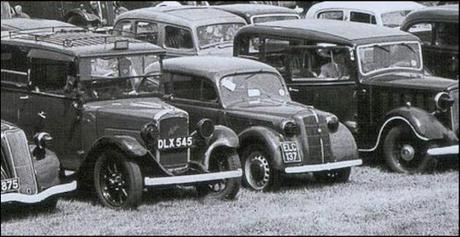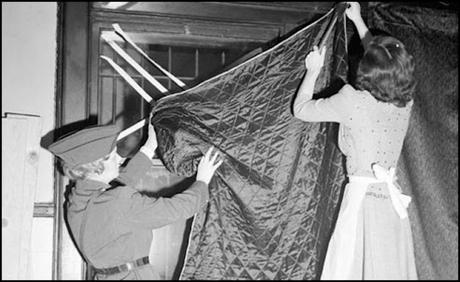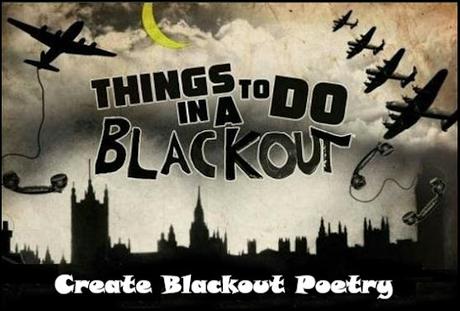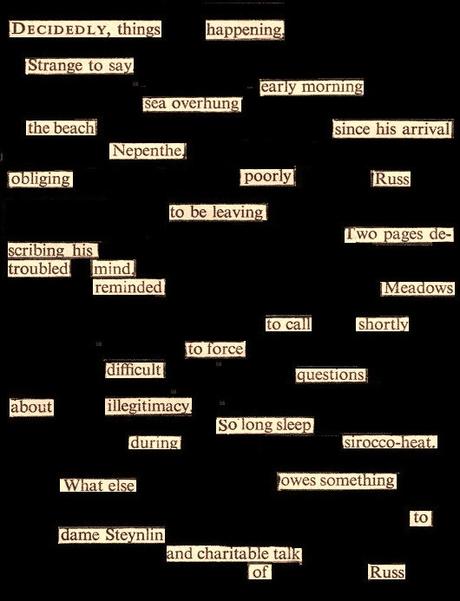Musing on blackout and redaction made we think of wartime, secrets and subterfuge, the second world war in particular, and Hitler's blitzes, when the people of Britain went to great lengths to black the country out every night so as not to give the Luftwaffe's bombers any helpful clues as to where to drop their bombs. The injunction to black out even extended to motor vehicles (see below).

'blackout' headlamps on WWII vehicles
I didn't know, until researching for this blog, that special slitted headlight guards were manufactured and fitted to civilian and military vehicles alike from 1940 onwards, designed to diffuse beams and make night-time traffic harder to spot from the air. I'm assuming it also made driving round at 30mph in almost total darkness (save for nights of silvery moonlight) quite a challenging business and a bit of an acquired skill.I was more familiar with the concept of blacking out windows and doors, from films and literature referencing World War II. In fact, the concept had been championed by Churchill as early as the First World War when he was First Lord of the Admiralty and he wanted a blackout of coastal towns so as to make it more difficult for German battleships to identify targets for attack from the sea. It was left to local councils to implement the campaign. By the time of the Second World War and the new threat of bombardment from the air, blackout precautions became mandatory on a national scale for homes, shops, and factories from September 1939 onwards.

'blackout' curtains in WWII homes
The regulations stipulated that all windows and doors should be covered from the inside at night to prevent the escape of any light that might aid enemy aircraft to identify areas of population. Thick fabrics (as shown above), light-tight wooden shutters, pieces of carpet or stiff cardboard blinds were advocated. Factories and workshops with large areas of glass windows or glass roof panels were ordered to paint them black. In addition, all external lights, from streetlamps to porch lights, were to be turned off during the hours of darkness. Air Raid Precaution wardens would patrol at night to ensure compliance and anyone failing to black out their premises was liable for a hefty fine. It was a well-observed but largely unpopular imposition which did little for morale.With hindsight, night-time blackouts probably did very little either to thwart the assaults of the German bombers because navigators relied more on reflections from bodies of water, railway track and major roads as they cross-referenced what they could see on the ground with their route maps and by 1944 the stringency of the regulations had been slackened somewhat from 'blackout' to 'dim-out', much to everyone's relief.

make poetry not war
And so to this exercise in being creatively destructive (or destructively creative). For text material I used the novel 'South Wind ' by Norman Douglas (published during the First World War). I'd bought it recently for £1 in a second-hand bookshop in the Lake District as holiday reading but gave up part way through, something I rarely do. I realised I didn't care for it much. Therefore I sacrificed one of its rather tanned pages to the cause and started redacting away. The result (scanned into my laptop for converting into an image) is presented here below:
Russ - my first attempt at a 'blackout' poem
What's that all about then? Does it even make for an interesting poem? What I think is that the creator of blackout poetry is constrained not by form or structure (as is usually the case) but by the vocabulary on offer, I found the process limiting in that respect, even more so than when creating collage poetry. For that reason I decided to write an additional poem, a commentary on the whole experience. Fresh from the imaginarium, I offer you my...Deep Fake Tan Page Poem #1In one obscure corner of a sooty dreamself-esteem lay dying for want of breath.
Its sinister devil's hand took up the Book of Douglas, used it for a fan but the spine
cracked and a single tan page floated free.Russ had never read past page 39, as style
and content were not to Meadows' likingin those dark hours tunnelled deep below
a city where bombs reigned. With fountainpen by flickering candlelight he sent words
and phrases into black obscurity for no endthan to obfuscate the tedium of addiction to
his drug of choice. Yet what remained whenhe awoke from lethargy made meaning clear
as smoky morning light in rubbled squares.He loved Nepenthe hopelessly, the bastard
didn't care, was no longer there, so the pityeverybody spoke must drive him to despair.
To finish on a sustained black note, here's a musical bonus (and why not?), Talking Heads performing Life During WartimeThanks for reading, S ;-) Email ThisBlogThis!Share to TwitterShare to Facebook
